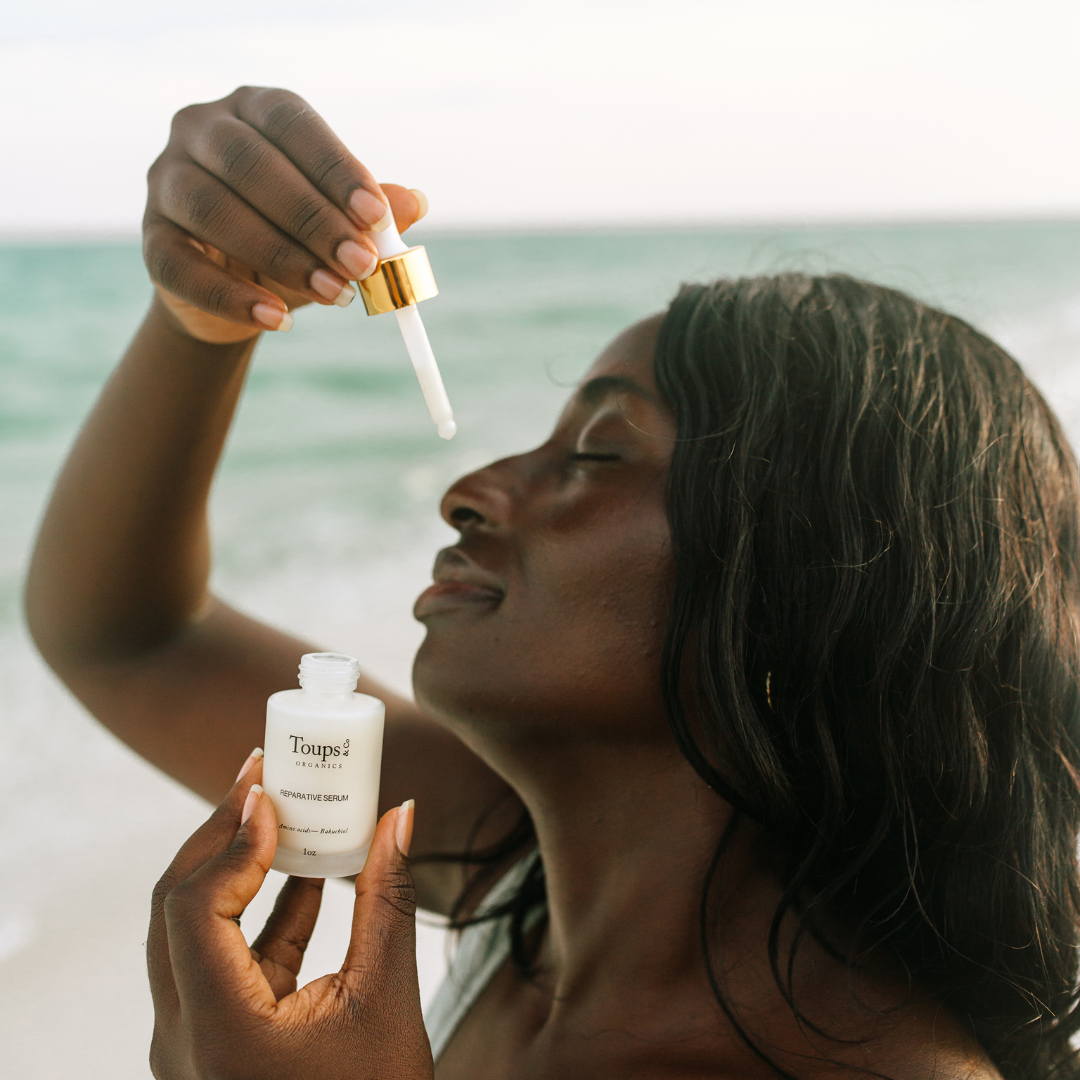As your skin matures, you may notice changes in your makeup and skincare needs. The same products you used in your twenties no longer produce the same effortless glow. Actually, they feel dehydrating, irritating, and just wrong.
This isn’t an uncommon experience for mature skin. As you age, your skin loses nutrients and reacts differently to products. Learning how to pivot your skincare routine to best nourish, moisturize, and support your changing skin is a normal part of growing older.
This change shouldn’t be dreaded. Actually, it can be a positive shift to high-quality ingredients, nontoxic skincare, and a routine that elevates the new you.
How to Take Care of Mature Skin
As you age, you may need to adjust your skincare routine, diet, and lifestyle to support your skin. Here’s a quick overview of how to take care of mature skin (from a holistic perspective).
Always Moisturize
As you age, your skin naturally loses moisture. This may contribute to premature aging, since dry skin tends to accentuate wrinkles and fine lines. The right moisturizer for aging skin can quickly reverse scaling, flaking, sensitivity, and smooth out wrinkles.
Promote Healthy Skin Cell Turnover
As you age, you may notice your wounds don’t heal as quickly, while wrinkles deepen in your forehead or around your eyes. This is the physical manifestation of slow cell turnover (meaning your cells don’t regenerate as quickly).
The good news is that you can preserve your skin’s youth by quickening cell turnover. Start with a gentle exfoliant (like AHA fruit acids), nature’s retinol (bakuchiol serum), or antioxidant-rich skincare products. A diet full of amino acids, antioxidants, and collagen can also support cell turnover — from the inside out.
Choose Nontoxic Skincare Products
There’s never a good time to use chemicals on your skin, but it’s especially harmful as you age. Common chemical skincare ingredients (like phthalates) are associated with faster aging, so they’re not a good choice for mature skin. Plus, chemicals tend to dry out the complexion and expose you to hormone disruptors.
Encourage Blood Flow
When it comes to aging skin, many experts forget about the importance of blood flow. Getting enough blood to your face may be the most important part of taking care of your skin. This helps with the transportation of oxygen and nutrients, and it can increase collagen production.
Lymphatic massage, gua sha, facial massage, infrared sauna use, exercise, and face steaming can all support healthy blood flow while providing a little self-care.
Common Concerns for Aging Skin (And What to Do About Them)
Mature skin has different needs. As your skin begins to age, you might notice new concerns, like sun spots, fine lines, and inconsistent skin tone. Here’s what to do about them:
Sun Damage
Sun exposure isn’t inherently bad. But too many sunburns (or tanning beds) can result in premature aging. Sun damage appears as sun spots, fine lines, and inconsistent skin tone — but it can be reversed. We recommend antioxidant-rich serum, nutrient-dense face moisturizer, and a nontoxic oil cleanser.
Wrinkles and Fine Lines
Fine lines may first appear on your forehead and around your mouth and eyes. If your skin isn’t properly moisturized (or if you live in a dry climate), they could pop up prematurely. Starting in your mid-twenties, always make sure you use a daily moisturizer to avoid this problem.
To soften fine lines and wrinkles, add ingredients like AHA fruit acids, bakuchiol, fatty acids, vitamin A, and antioxidants to your skincare routine.
Inconsistent Skin Tone and Texture
The tone and texture of your skin really impact its youthfulness. And, it’s easier to preserve than people think. We recommend starting with nutrient-dense plant oils, like castor oil and jojoba oil. Vitamin C, vitamin E, vitamin A, and fruit extracts are also helpful for toning and smoothing the complexion.
Chronic Dry and Flaky Skin
Remember, it’s natural for your skin to lose moisture as it ages. And this should never be “remedied” with chemical-based formulas that disrupt your hormones.
Our ancestors used tallow balm as an everyday solution to dry, flaky, and cracked skin. We recommend it because the chemical composition of tallow is so similar to human skin. The fatty acids and nutrient profile carefully lock in moisture. They’re also bioactive and bioavailable, meaning the nutrients are easy for our skin to absorb and use.
What Are the Benefits of a Serum for Mature Skin?
Face serums are mindfully designed to brighten and hydrate the skin. They go one step further than a moisturizer: delivering specific nutrients based on your needs. There are a variety of serum options for acne, redness, hydration, and aging skin.
- Better nutrient absorption. A serum is made to deliver nutrients right to the skin, penetrating deep into the pores.
- Nutrient-dense ingredients. A high-quality serum should include recognizable ingredients that are science-backed and mindfully sourced.
- Plant-based oils to target skin concerns. Most serums use plant-based oils and vitamins to target individual skin concerns, like redness, dry skin, and wrinkles.
- Quick absorption. The best serum formulas are lightweight and absorb quickly into the skin. They should be followed up with a moisturizer.
- Calming properties to soothe irritation and redness. As long as your serum contains high-quality ingredients, it should help calm irritation and redness with vitamins, minerals, and soothing nutrients.
Best Serums for Mature Skin
How do you choose the best serum for mature skin? Here are some ingredients we recommend:
Serum for Wrinkles
A serum to target wrinkles should include ingredients like vitamin A, bakuchiol (a retinol alternative), and vitamin C for optimal cell turnover. Each of these ingredients is backed by years of research, is safe to use, and has been used for centuries in ancestral skincare.
Serum for Skin Texture
We recommend high-quality plant oils to support smooth and even skin texture. Castor oil, jojoba oil, and carrot oil deliver much-needed nutrients to tone the skin. You might also pair your serum for mature skin with a gentle exfoliant or AHA fruit acids.
Serum for Moisture
Some serums for mature skin are considered “dry serums,” meaning they deliver nutrients but not moisture. In this case, you should follow up your serum with a moisturizer or choose a more hydrating serum with an oil base.
Moisturizer vs. Serum for Aging Skin
In a perfect world, you should use both moisturizer and serum for mature skin. These products each deliver something different. The serum targets age spots and fine lines with plant-based ingredients and lightweight formulas. The moisturizer acts as a final layer, locking the nutrients into your skin and allowing them to do their job.
If you want to simplify your skincare routine, you can use a nutrient-dense moisturizer like tallow balm. This is an acceptable alternative to using moisturizer and a serum, since tallow balm contains natural vitamin A and fatty acids, which are great for aging skin.
High-Quality Ingredients: The Must-Haves for Aging Skin
There are so many skincare products available for aging skin. But not all of them deliver on their promises. In fact, most mainstream skincare contains fractionated ingredients that aren’t nourishing or bioavailable. Plus, they’re often diluted with fillers, chemicals, and fragrances. Not only can these ingredients age your skin, they can also contribute to hormone imbalance.
As you learn about serums for aging skin, make sure to check the back of your bottle. You’ll want to look for a relatively short list of whole and recognizable ingredients. Here are some of our favorites:
- Bakuchiol. This is also called “nature’s retinol.” It doesn’t contain the same properties as retinol, but it has shown to create the same results. Bakuchiol is a plant-based antioxidant that aids in cell turnover but is gentle on sensitive skin (aka no retinol burn).
- Vitamin C. One of the most powerful antioxidants, vitamin C should always be used in its whole form.
- Vitamin E. This is a great natural remedy for scars. Used in an anti-aging face serum, it can help soften age spots.
- AHA Fruit Acids. Providing they aren’t synthetically produced (or exposed to formaldehyde during processing), AHA fruit acids can act as a powerful natural exfoliant. They eliminate dead skin cells and give new skin cells space to thrive.
- Castor Oil. Most people know about castor oil, but they don’t realize what a powerful anti-aging remedy it can be. It’s extremely nutrient-dense (if it’s cold-pressed) and may help smooth, plump, and moisturize dry skin.
- Jojoba Oil. This is one of the few plant-based oils that’s similar to human sebum. It’s nourishing, gentle, and tolerated well by people with sensitive skin.
- Hyaluronic Acid. This is another natural skincare ingredient that supports wound and scar healing. It should also plump the skin, improving fine lines and loose skin.
Elevate Your Mature Skin with Beauty Inspired by Nature
Our mission at Toups and Co is to provide the most natural and nourishing skincare available. Each product is mindfully crafted to target your skin concerns with nature-inspired ingredients that work better than chemical ones.
But good skincare isn’t just about the ingredients. It’s about the experience, too. That’s why we recently launched our brand-new serum bottles — so your skincare feels elevated, luxurious, and clean every day.

